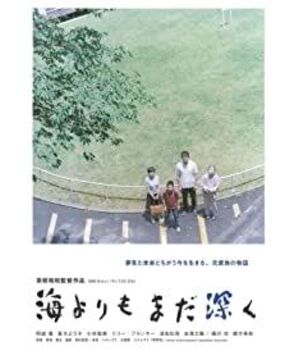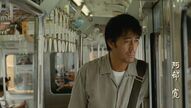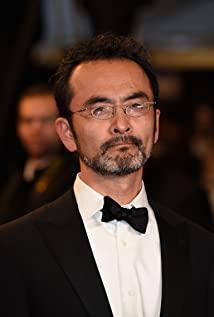In the film "Deeper Than the Sea", the character that moved me the most was my mother, Shuko.
After her husband died, her daughter persuaded her to make more friends. But Shuzi said, "Making friends at my age will only increase the number of people who come to the funeral."
Hearing this, I couldn't help but laugh. I thought to myself, only people who truly understand can say such mean, negative but honest and lovely words.
Dare to use "death" to ridicule yourself, only to reveal the open-mindedness of "life".
Shuzi is such an open-minded mother.
She can put the experience of life that the years have passed by, and press it into her daily life without a trace.
We just watch her life, look at this old body, walk, sit and lie down, cook, and grow flowers in quiet time... as if we see the essence of life.
As she was cooking, she said, "This konjac has to be cooked slowly, and it will be delicious after a night, just like people."
The film "Deeper than the Sea" is about the separation of people.
The whole film is filled with a sense of sadness, in which there is the sad aftertaste of the death of the father, and the sadness of the family's broken parting.
What is easily overlooked by us is that the most profound sufferer of all this pain is actually Shuzi.
When her husband dies, she leaves for another world; her son gets divorced and can start a new life. Only Sookie, who was ruthlessly abandoned, suffered double the pain alone.
As Roland Barthes wrote in "The Lover's Whisper": "Thinking of a lover who is far away is one-way, always showing through the side that stays in place, not the side that leaves."
Shuzi, is such a person who was left in place.
However, we see almost no sadness on her face, only calm and relief.
The day after her husband's funeral, Shoko threw away all his belongings.
The son was puzzled: "We've been together for 50 years, and it's like this in the end?"
Shuzi smiled and replied, "Don't be stupid, it's just because we've been together for 50 years."
Because that love that has been polished by time is extraordinarily light and profound. It has no weight, but is vast and vast, so that no object can carry it, but it can only be put into memory.
Only memory is the paradise of the dead. They will be there, with eternal life.
In fact, Sookie's marriage was not a happy one.
The husband is a poor man, idle and heavily in debt, but Shuzi has stumbled and guarded him all his life.
This may be difficult to understand.
Coincidentally, in real life, Ms. Shu Xilin, who plays Shuzi, also has the same situation.
At the age of 30, she fell in love at first sight with rock singer Yuya Uchida.
But in the marriage of more than 40 years since then, the husband has frequently cheated, domestic violence, theft, and entangled with other women...
Even so, the tree Xilin still does not leave her husband.
When asked by others, she replied: " If we meet again in the next life, I will still fall in love with him and live a miserable life again. "
" I love you, but it has nothing to do with you. "
This may be the purest definition of "love".
As in the film, Sookja was saddened and said, "At this age, I haven't said anything like 'Love him deeper than the sea' to anyone."
In fact, needless to say, she has already done it.
If the love for the husband is the fate of the past life; then the love for the son is the fetters of this life.
When she saw curry on her son's shirt, Shuzi would still wipe it with her hands without hesitation, even if her son was over forty and no longer a child.
This is a mother's instinctive reaction.
In the body of many sons, Shuzi seems to see the shadow of her husband.
He is a down-and-out writer. He won an award when he was young, and then he was exhausted.
Finally, the wife couldn't bear it anymore and left with her son, and the family was separated.
Many had to live alone, see their sons once a month, and monitor their wives to protect the marriage to no avail.
All this, my mother sees it.
Because mother is the one who knew that we would break up a little earlier than us.
However, Shuzi couldn't ask her daughter-in-law to be the same as herself. Even if she married a useless man, she would stay together for the rest of her life.
She had to watch her son helplessly and screw up her life with her own hands.
The second half of the film is the most intriguing part of the film.
Because of the passing of the typhoon, the mother stayed and the family was able to reunite.
No one slept that night.
The adults couldn't sleep, and the children didn't want to sleep. The mother said: When I'm old, sleep for a while is enough.
Everyone stubbornly opened their eyes, wanting to take another look at their past life.
Shuzi knew in her heart that this might be the last time the family would get together.
So, she seized this last chance and quietly designed a farewell ceremony for this soon-to-be-broken family.
She took out the album, flipped through the photos one by one, and talked about the past with her family;
She made dinner—steaming curry udon noodles, her husband’s favorite flavor when he was alive;
She put on a brand new quilt and wanted many families to relive the feeling of living under the same roof;
...
All of this, from the very beginning, was not for retention, but for farewell.
Shuzi took out a lot of essays from her youth and gave it to Zhenwu: "Look, your father was very good at writing essays when he was a child. You know, literary talent is a great thing, and not everyone has it."
In this way, she is helping her son earn back a little bit of fatherhood in front of his son.
Facing her many sons, she inadvertently said, " Why don't men know how to cherish the moment? They are always chasing after what they have lost, thinking about unfulfilled dreams, and being trapped by these things, how can they be happy every day?"
At that moment, the camera shot slightly downward, looking at the son sitting on the ground through the mother sitting in the chair. A lot of people seem to have returned to their childhood, and it was the same night, in the same posture, listening to the teachings of their mothers that were clearly intentional but pretended to be unintentional.
As soon as the camera turned, Shuzi was already sitting beside her daughter-in-law. She stroked her daughter-in-law's back and quietly looked at her profile. The first sentence she opened her mouth was, "Is it really impossible for the two of you?"
This detail is extraordinarily real and extraordinarily moving.
This is how mothers persuade their sons to let go and not force them; on the other hand, they do the last bit of effort for their sons, even if it is futile.
However, just like the song "Premonition of Parting" that suddenly sounded on the radio, Teresa Teng's soft and tactful voice has prepared all her emotions, just waiting for the parting to be staged.
In the end, Shuzi gave the wooden box containing Zhenwu's umbilical cord to her daughter-in-law: "I will leave it to you for safekeeping in the future."
And the tears finally burst: "Alas, how did things become like this?"
The English name of "Deeper than the Sea" is After the storm - after the typhoon.
The sea and typhoons are the most natural existences. Putting them behind a parting, as the tone of the whole film, also makes the parting of this small family instantly reveal the impermanence of life.
And whether at the juncture of life and death, or on the verge of separation, what I saw was a thin mother, standing there stubbornly.
She may not be the most eye-catching character in the film, but she is an indispensable force in life.
In her broken life, she tried to spell out her husband's appearance for herself and a reason to live for her son, and what supported all this was the "love" in her heart that was deeper than the sea.
Just like the next morning, Shuzi stood on the balcony, with a smile that slept all night, waving goodbye to her son's family.
The old man was left in place once again, watching them go away intact.
Time and time again, I watched my relatives go away.
However, as long as they are all well, it is the mother, the most gratifying thing.
View more about After the Storm reviews











